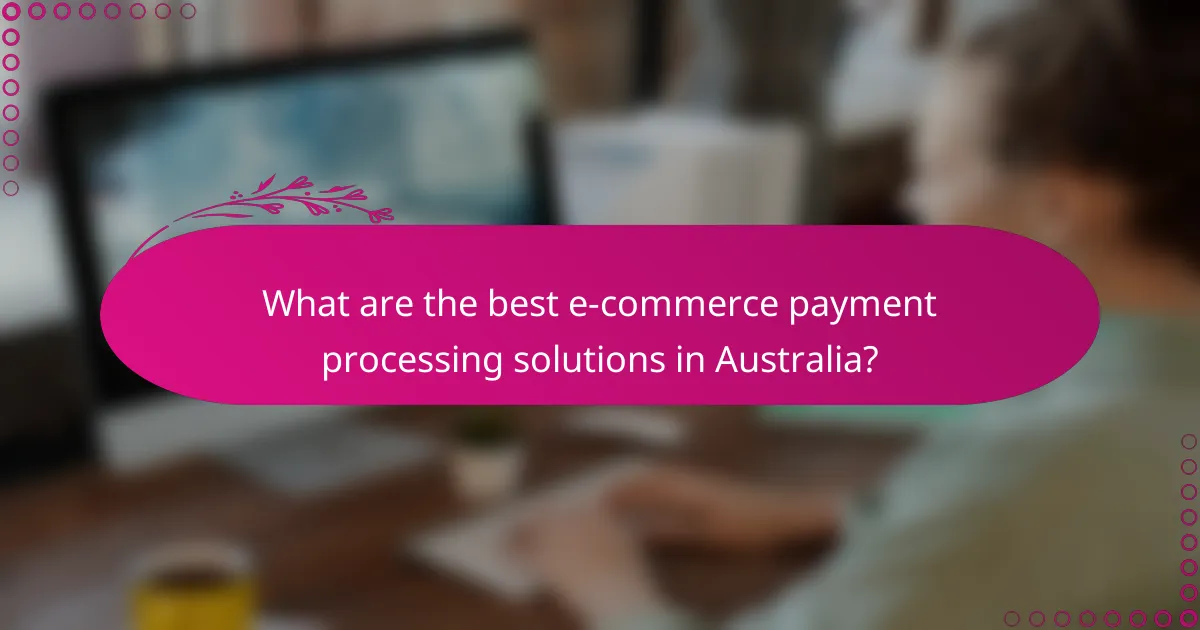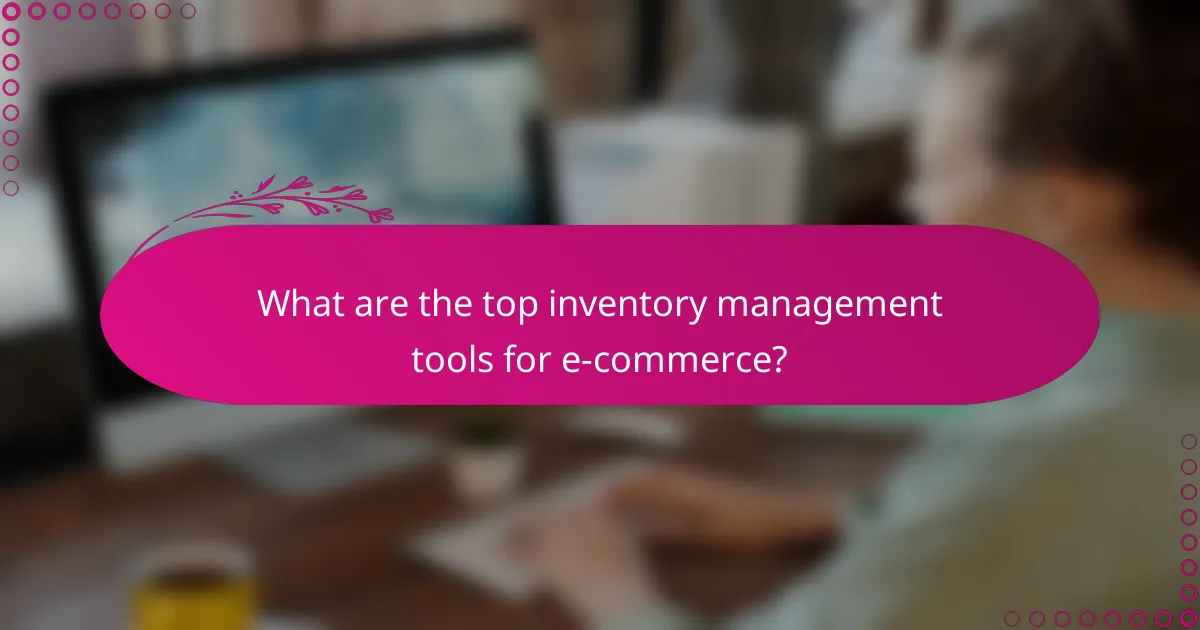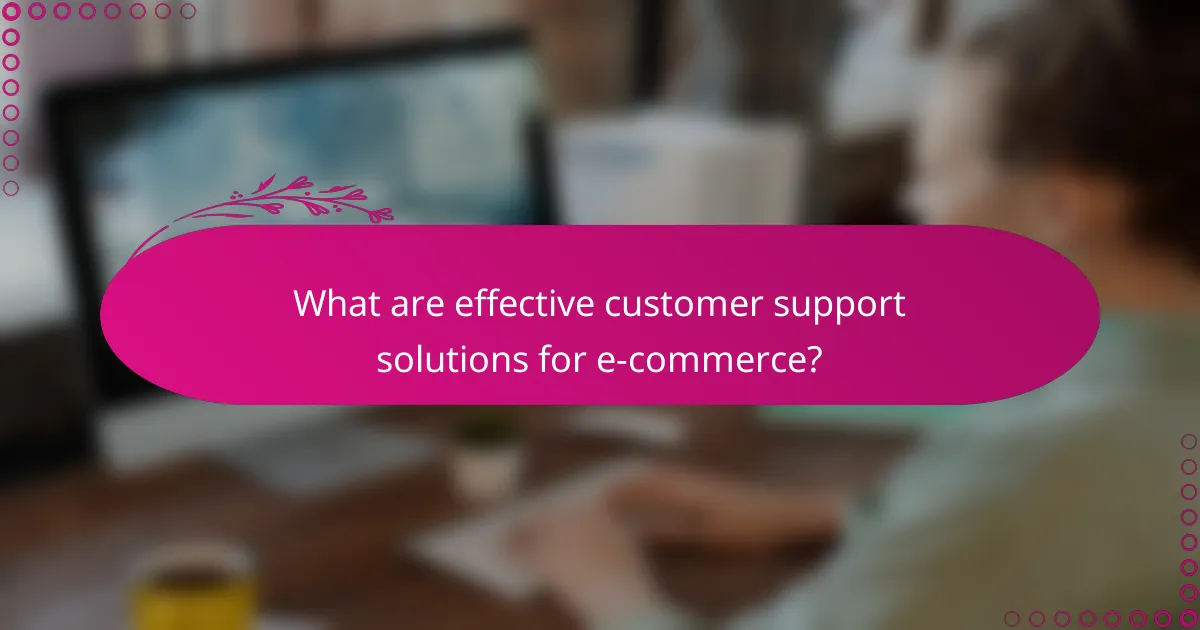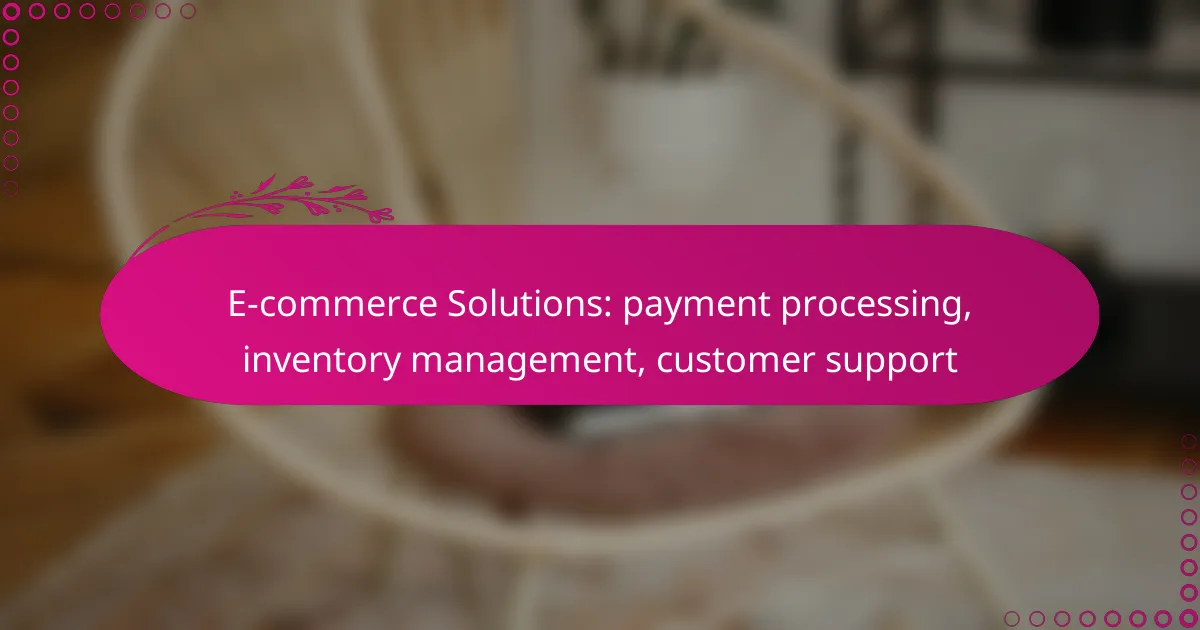E-commerce solutions encompass essential components such as payment processing, inventory management, and customer support, all crucial for online business success. Effective payment processing platforms like PayPal and Stripe facilitate secure transactions, while robust inventory management tools enhance stock control and order fulfillment. By integrating these solutions, businesses can streamline operations and improve customer satisfaction.

What are the best e-commerce payment processing solutions in Australia?
The best e-commerce payment processing solutions in Australia include PayPal, Stripe, Square, Afterpay, and Zip Pay. These platforms offer various features tailored to meet the needs of online businesses, from transaction fees to integration capabilities.
PayPal
PayPal is one of the most widely recognized payment processing solutions in Australia, allowing businesses to accept payments from customers using credit cards, debit cards, and their PayPal accounts. It offers a straightforward setup and is known for its buyer protection policies, making it a popular choice among consumers.
Consider transaction fees, which typically range from 1.5% to 3% per transaction, depending on the volume and type of payment. Businesses should also be aware of potential currency conversion fees if dealing with international customers.
Stripe
Stripe is a robust payment processing platform that supports a wide range of payment methods, including credit cards, digital wallets, and bank transfers. It is particularly favored by developers for its customizable API, allowing for seamless integration into various e-commerce platforms.
Transaction fees with Stripe are generally around 1.75% for domestic cards and 2.9% for international cards. Businesses should evaluate their technical capabilities and whether they need advanced features like subscription billing or fraud prevention tools.
Square
Square offers an all-in-one payment processing solution that includes point-of-sale systems and online payment capabilities. It is ideal for small to medium-sized businesses looking for an easy-to-use interface and comprehensive features.
Square charges a flat rate of around 1.6% for online transactions, making it predictable for budgeting. Additionally, it provides tools for inventory management and customer engagement, which can enhance overall business operations.
Afterpay
Afterpay allows customers to make purchases and pay for them in installments, which can increase conversion rates and average order values. This buy-now-pay-later service is particularly popular among younger consumers in Australia.
Merchants typically pay a fee of around 4-6% per transaction, which can be higher than traditional payment processors. However, the potential for increased sales volume may offset these costs, making it a strategic option for many retailers.
Zip Pay
Zip Pay is another buy-now-pay-later option that enables customers to shop online and pay in installments. It is designed to enhance customer purchasing power while providing businesses with a competitive edge.
Zip Pay charges merchants a fee that can vary based on transaction size and volume. Businesses should consider how this payment option aligns with their target market and whether it can drive additional sales through increased customer flexibility.

How to choose an e-commerce payment processor?
Choosing an e-commerce payment processor involves evaluating transaction fees, integration capabilities, and customer support. A suitable processor should align with your business model, ensuring cost-effectiveness and seamless operation.
Transaction fees
Transaction fees are the charges incurred each time a payment is processed. These fees can vary widely, typically ranging from 1.5% to 3.5% of the transaction amount, plus a fixed fee per transaction. It’s crucial to compare these costs across different processors to find the most economical option for your sales volume.
Consider additional fees, such as monthly maintenance or chargeback fees, which can impact your overall expenses. Look for processors that offer transparent pricing structures to avoid unexpected costs.
Integration capabilities
Integration capabilities refer to how well the payment processor connects with your existing e-commerce platform and other tools. A good processor should support popular platforms like Shopify, WooCommerce, or Magento, allowing for a smooth setup and operation.
Check for available APIs and plugins that simplify integration. The more compatible a processor is with your systems, the less time and resources you will spend on setup and maintenance.
Customer support
Reliable customer support is essential for resolving issues quickly and minimizing downtime. Look for payment processors that offer 24/7 support through multiple channels, such as phone, email, and live chat.
Evaluate the quality of support by reading reviews or seeking recommendations. A processor with responsive and knowledgeable support can significantly enhance your e-commerce operations, especially during peak sales periods.

What are the top inventory management tools for e-commerce?
The top inventory management tools for e-commerce streamline stock control, improve order fulfillment, and enhance overall operational efficiency. These tools help businesses track inventory levels, manage suppliers, and forecast demand effectively.
TradeGecko
TradeGecko, now known as QuickBooks Commerce, offers a robust platform for managing inventory across multiple sales channels. It provides features like real-time stock tracking, order management, and integration with various e-commerce platforms such as Shopify and WooCommerce.
Consider using TradeGecko if you operate a medium to large business that requires extensive inventory control and reporting capabilities. Its user-friendly interface and automation features can significantly reduce manual tasks.
DEAR Inventory
DEAR Inventory is a comprehensive inventory management solution designed for small to medium-sized businesses. It includes features for purchasing, sales, and inventory tracking, along with integrations for accounting software like Xero and QuickBooks.
This tool is ideal for businesses looking for a complete solution that combines inventory management with financial oversight. DEAR Inventory’s strong reporting capabilities can help you make informed decisions based on your stock levels and sales trends.
Unleashed Software
Unleashed Software focuses on providing real-time inventory management for manufacturers and distributors. It allows users to track inventory across multiple locations and offers detailed insights into stock levels and product performance.
Choose Unleashed if your business deals with complex inventory needs, such as batch tracking or product variants. Its integration with various e-commerce platforms and accounting systems makes it a versatile choice for growing businesses.
Zoho Inventory
Zoho Inventory is part of the Zoho suite and offers a cost-effective solution for small businesses. It features inventory tracking, order management, and shipping integrations, making it suitable for e-commerce operations.
This tool is a great option for startups and small enterprises due to its affordability and ease of use. Zoho Inventory also provides automation features that can help reduce the time spent on repetitive tasks, allowing you to focus on growing your business.

How to select an inventory management system?
Selecting an inventory management system involves evaluating your business needs, scalability, and integration capabilities. Focus on features that enhance efficiency and accuracy, ensuring the system aligns with your e-commerce operations.
Scalability
Scalability is crucial for an inventory management system, especially as your business grows. Look for solutions that can handle increased product lines and sales volumes without compromising performance.
Consider systems that offer tiered pricing or modular features, allowing you to pay for only what you need initially and expand as your requirements evolve. This flexibility can save costs in the long run.
Real-time tracking
Real-time tracking enables you to monitor inventory levels instantly, reducing the risk of stockouts or overstock situations. Choose a system that provides live updates on inventory status across all sales channels.
Effective real-time tracking can improve order fulfillment speed and customer satisfaction. Look for features like automated alerts for low stock levels and integration with sales data to forecast demand accurately.
Integration with e-commerce platforms
Integration with e-commerce platforms is essential for seamless operations. Ensure the inventory management system can connect with your existing online store, payment processors, and shipping solutions.
Check for compatibility with popular platforms like Shopify, WooCommerce, or Magento. A well-integrated system can streamline processes, reduce manual data entry, and enhance overall efficiency.

What are effective customer support solutions for e-commerce?
Effective customer support solutions for e-commerce focus on enhancing customer satisfaction through timely assistance and efficient communication. These solutions streamline interactions, manage inquiries, and provide valuable insights to improve overall service quality.
Zendesk
Zendesk is a widely used customer support platform that offers a range of tools for managing customer interactions across various channels, including email, chat, and social media. Its intuitive interface allows businesses to track and respond to customer inquiries efficiently.
Key features include ticketing systems, automated responses, and reporting analytics. Businesses can customize workflows to suit their needs, ensuring that customer queries are addressed promptly. Pricing typically starts at around $5 per agent per month, making it accessible for small to medium-sized enterprises.
Freshdesk
Freshdesk provides a comprehensive suite of customer support tools designed to enhance user experience. It includes features such as multi-channel support, ticket management, and a knowledge base for self-service options.
This platform is known for its user-friendly setup and robust automation capabilities, which help reduce response times. Freshdesk’s pricing starts at approximately $15 per agent per month, offering various tiers to accommodate different business sizes and needs.
Intercom
Intercom focuses on real-time customer communication, allowing businesses to engage users through live chat, chatbots, and targeted messaging. This solution is particularly effective for proactive customer support and onboarding new users.
Intercom’s features include user segmentation, automated responses, and detailed analytics to track engagement. Pricing is generally higher, starting around $39 per month, reflecting its advanced capabilities tailored for growing businesses looking to enhance customer relationships.
